Last Tuesday, Fareed Zakaria responded to our initial blog post showing that he had clearly and inappropriately copied and pasted other journalists’ work. He did so by demonstrably lying and getting a number of facts just plain wrong. We think our work held up pretty well, even more so after the response from a pretty diverse group of journalists. For those wondering what constitutes plagiarism, it might be helpful to first read this walkthrough from the Walter Cronkite School of Journalism. Then keep scrolling, because today we’re adding even more to the pile by showing how Zakaria blatantly and repeatedly plagiarized in not just what is his most popular book, but two different cover stories for the magazines he used to serve as editor for, Foreign Affairs and Newsweek.
[Note: while we’re still using side-by-side image files to document our examples here, for convenience’s sake the end of this post also includes text versions.]
A LOOK AT PRECEDENT
Before looking at today’s examples, it’s important to keep in mind that it only took one paragraph to land Zakaria in hot water in 2012. As Newsbusters pointed out back then, here is the passage on gun control from Jill Lepore’s 2012 New Yorker article:
And here is Zakaria’s passage lifting from that same piece:
When called out on this, Zakaria did not, as he did Tuesday, claim to be just citing facts. Instead, he called it a “terrible mistake.” It’s not clear how his standards have changed since then, but we’re hoping the examples below will give him a chance to elaborate.
A POST-ATTRIBUTION WORLD: THEFT IN ZAKARIA’S BESTSELLER
Fareed Zakaria’s 2008 The Post-American World is the book that lets him call himself “a New York Times’ bestselling author.” The Times itself called it a “relentlessly intelligent book” and it gained even more prominence when then-Senator Barack Obama was spotted holding on to it during the presidential campaign. The book proved so popular that in 2011, a “2.0” edition was released with additional material.
Post-American World can be best described up as the kind of book your dad bought at the airport to kill time reading about This Changing Planet Of Ours, then bought again later because it had a 2.0 at the end, the way his phone’s fart noise app did when it added new fart noises. Zakaria’s website says the work features “trends he identified [that] have proceeded faster than anyone could have anticipated…As Zakaria eloquently argues, Washington needs to begin a serious transformation of its global strategy, moving from its traditional role of dominating hegemon to that of a more pragmatic, honest broker.”
It all sounds like a very intense effort by Zakaria to alert the nation to our shifting role in the world. What may not be publically known is that the 2.0 update, as well as related work that appeared in other outlets, feature content that Zakaria’s lifted heavily and often word-for-word, without attribution. On more than a number of occasions, Zakaria has taken entire paragraphs from the authors and shifted them around in an apparent attempt to avoid detection.
Example 1: Zakaria lifts verbatim from London School of Economics professor Fawas Gerges
Gerges is a professor at the London School of Economics who’s written extensively about the Middle East and appeared on Zakaria’s CNN show multiple times. Barely a dozen pages into Post-American World 2.0, Zakaria discusses Gerges’ analysis of some polling on the Middle East. He doesn’t say where he’s getting the analysis from; Gerges is not cited anywhere in the endnotes of the book. A little digging reveals that Zakaria appears to have not just taken the polling data from Gerges’ 2009 version of his book, “The Far Enemy,” and updated it slightly, but appropriated almost all of Gerges’ writing verbatim:
A paragraph later, Zakaria goes even further with his theft, lifting passages from Gerges’ October 2007 article for the Christian Science Monitor. Gerges had written about signs that Osama Bin Laden was worried about Al Qaeda in Iraq. Zakaria cribs from the article entirely word-for-word, only pausing to switch the second and third paragraphs around. For clarity, we’ve highlighted the relevant sections by color:
The same text appears in a 2010 Newsweek column by Zakaria. It was the magazine’s cover story.
When caught, some plagiarists hem and haw about their theft being a mere citation error. We want to stress that Zakaria does not cite Gerges anywhere in the endnotes. See for yourself:
Examples 2 thru 6: Zakaria copies a number of passages from Karl Meyer’s work in the World Policy Journal
Karl E. Meyer is an old-guard journalist and academic, having served as a member of the Washington Post’s editorial board, editor of the World Policy Journal, and visiting professor at Yale. He also happens to be another uncredited source of Zakaria’s. As we show below, his 2000 piece about Queen Victoria’s 1897 Diamond Jubilee and the decline of the British Empire in the World Policy Journal, “Edwardian Warning: The Unraveling of a Colossus” was lucky it wasn’t left on cinder blocks.
Here is Meyer’s in the WPJ on one eight-year-old Arnold Toynbee’s experiences of the Diamond Jubilee, alongside Zakaria telling the same story in an extended Post-American World section on the same subject:
We’re presenting this to show the extremely narrow way in which Zakaria cites Meyer. The footnote (which is the only mention of Meyer or his article in the book) is citing Meyer’s use of the quote from Toynbee, not his broader scholarship on the Diamond Jubilee. When it comes to attribution this citation is inadequate in this example alone because it doesn’t indicate that Zakaria is closely mirroring Meyer’s contextualization of the quote. Some might see a room for debate here. For the sections below, they shouldn’t.
In his article, Meyer goes on at length describing the fleet that attended the Diamond Jubilee. Zakaria writes a description of the exact same scenario, with the same description of ships and sailors and the same Rear Admiral Prince Henry of Prussia looking on. There is no credit to Meyers. Again, we’ve used color to show how Zakaria has remixed the order of Meyer’s writing:
(A side note – when Zakaria lifts a passage, he often switches the spelling of the numbers within. If the numbers are spelled out, he changes them to figures, and vice versa. It’s not clear if this is an attempt to evade plagiarism software, but it’s certainly in violation of the Associated Press stylebook’s guidelines on numerals, which Meyer, on the other hand, adheres to.)
Here’s Meyer again on the British Empire and Olympic history, alongside passages that Zakaria again rearranges in an apparent attempt to evade Microsoft Plagiatron ’98 or whatever software his editors were using. We had to use a lot of colors for this one:
But there’s more fruit from the tree here. In 2008, he adapted a good chunk of Post-American World into a cover story for the May/June issue Foreign Affairs entitled “The Future of American Power.” The article uses most of the same passages we’ve shown were stolen from Meyer:
One could expect that given Zakaria’s experience working there from 1993 to 2000, including as managing editor, he would understand the need to use citations when borrowing so extensively. As with the book, no citations appear in the Foreign Affairs piece.
TO CONCLUDE: HOW MANY EXAMPLES OF PLAGIARISM DO WE HAVE TO SHOW HERE?
Readers deserve and should be able to expect a level of trust with journalists and the outlets that publish them. When we show that someone’s work has clearly been lifted from other sources without attribution, it’s only fair to give the writer and the outlet in question a chance to do the right thing. Despite the pooh-poohing of Buzzfeed and digital media last month over Benny Johnson, what we’ve seen from more traditional sources this week is that you can apparently reach a point where ethics are no longer necessary as long as you’re bringing in ratings or a prestigious byline.
It’s hard to see how the depth and extent of the examples we’ve shown don’t already go far beyond what Zakaria was suspended for in 2012. W.W. Norton, the publisher of Zakaria’s book, Newsweek, and Foreign Affairs owe it to everyone who ever picked up a copy of his work to review and address these issues. Because while Fareed Zakaria is not the only major columnist we’ve discovered with a plagiarism problem, he is the one that’s yielded the most examples so far. If necessary, Our Bad Media will continue to highlight those examples in the days ahead.
TEXT OF THE PLAGIARISM EXAMPLES
Gerges, 2009, “The Far Enemy”: Last year Pew surveys showed that in Jordan, Pakistan, Indonesia, Lebanon, and Bangladesh there were substantial declines in the percentages saying that the suicide bombings and other forms of violence against civilian targets can be justified to defend Islam against its enemies. Wide majorities say such attacks are, at most, rarely acceptable. The shift has been especially dramatic in Jordan, where 29 percent of Jordanians now view suicide attacks as “often or sometimes justified,” down from 57 percent in May 2005. In Indonesia, the largest majority Muslim nation, 74 percent of respondents agree that terrorist attacks are “never justified,” a substantial increase from the 41 percent level to which support had risen in March 2004; in Pakistan that figure is 86 percent; in Bangladesh, 81 percent; and in Iran, 80 percent. Compare those figures with a recent study that shows that only 46 percent of Americans think that “bombing and other attacks intentionally aimed at civilians” are “never justified,” while 24 percent believe these attacks are “often or sometimes justified.”
Zakaria, Post-American World 2.0, p. 14: The London School of Economics professor Fawaz Gerges has analyzed polls from dozens of Muslim countries over the past few years. He notes that in a range of places— Jordan, Pakistan, Indonesia, Lebanon, and Bangladesh—there have occurred substantial declines in the number of people who say suicide bombing and other forms of violence against civilian targets can be justi ied to defend Islam. Wide majorities say such attacks are, at most, rarely acceptable. The shift has been especially dramatic in Jordan, where only 12 percent of Jordanians view suicide attacks as “often or sometimes justified” (down from 57 percent in 2005). In Indonesia, 85 percent of respondents agree that terrorist attacks are “rarely/never justi ied” (in 2002, by contrast, only 70 percent opposed such attacks). In Pakistan, that figure is 90 percent, up from 43 percent in 2002. Gerges points out that, by comparison, only 46 percent of Americans say that “bombing and other attacks intentionally aimed at civilians” are “never justi ied,” while 24 percent believe these attacks are “often or sometimes justified.”
Gerges, October 2007: And last month, one of bin Laden’s most prominent Saudi mentors, the preacher and scholar Salman al-Odah, wrote an open letter reproaching him for “fostering a culture of suicide bombings that has caused bloodshed and suffering and brought ruin to entire Muslim communities and families.” Bin Laden’s Al Qaeda was dealt another shattering blow from within when one of its top theorists, Abdul-Aziz el-Sherif, renounced its extremes, including the killing of civilians and the choosing of targets based on religion and nationality. In the past few months, Mr. El-Sherif – a longtime associate of Zawahiri, who crafted what became known as Al Qaeda’s guide to jihad – called on militants to desist from terrorism and authored a dissenting rebuttal against his former cohorts. In early October, Abdulaziz al-Ashaikh, the grand mufti of Saudi Arabia, issued a fatwa prohibiting Saudis from engaging in jihad abroad and accused both bin Laden and Arab regimes of “transforming our youth into walking bombs to accomplish their own political and military aims.”
Zakaria, Post-American World 2.0, p. 14-15: In 2007 one of bin Laden’s most prominent Saudi mentors, the preacher and scholar Salman al-Odah, wrote an open letter criticizing him for “fostering a culture of suicide bombings that has caused bloodshed and suffering, and brought ruin to entire Muslim communities and families.” That same year Abdulaziz al ash-Sheikh, the grand mufti of Saudi Arabia, issued a fatwa prohibiting Saudis from engaging in jihad abroad and accused both bin Laden and Arab regimes of “transforming our youth into walking bombs to accomplish their own political and military aims.” One of Al Qaeda’s own top theorists, Abdul-Aziz el-Sherif, renounced its extremism, including the killing of civilians and the choosing of targets based on religion and nationality. Sherif—a longtime associate of Zawahiri who crafted what became known as Al Qaeda’s guide to jihad—has called on militants to desist from terrorism, and authored a rebuttal of his former cohorts.
Meyer, Winter 2000/2001, World Policy Journal: “More typical were the delighted hurrahs of eight-year-old Arnold Toynbee, who watched the Jubilee parade from his uncle’s shoulders, and felt as if the sun itself were “standing still in the midst of Heaven, as it had once stood still there at the bidding of Joshua.
- Zakaria, Post-American World: In London, eight-year-old Arnold Toynbee was perched on his uncle’s shoulders, eagerly watching the parade. Toynbee, who grew up to become the most famous historian of his age, recalled that, watching the grandeur of the day, it felt as if the sun were “standing still in the midst of Heaven.”
Meyer: For the Diamond Jubilee, the biggest fleet ever assembled was on review at Portsmouth: 165 warships carrying 40,000 seamen and 3,000 guns, a line extending 30 ironclad miles. Observers from 14 foreign navies were able to inspect through binoculars the Royal Navy’s prize possessions, including 11 new battleships, unrivaled for their speed and armor, and 5 first-class and 13 second-class cruisers, together with scores of other battleships, cruisers, and torpedo-boat destroyers. Looking on from a creaking German battleship, British-built and now downgraded to first-class cruiser, was Rear Admiral Prince Henry of Prussia
- Zakaria: “During the Diamond Jubilee, 165 ships carrying forty thousand seamen and three thousand guns were on display in Portsmouth—the largest fleet ever assembled. [Footnote] Observers from fourteen foreign navies were in attendance, eagerly taking in the spectacle. One of them, the German rear admiral Prince Henry of Prussia, looked on enviously from the deck of his British-built battleship, which had recently been downgraded to a cruiser.”
Meyer: “The world took note. From Paris, the Figaro’s editorialist commented that Rome itself had been “equaled, if not surpassed, by the Power which in Canada, Australia, India, in the China Seas, in Egypt, Central and Southern Africa, in the Atlantic and the Mediterranean rules the peoples and governs their interests.” The New York Times went further: “We are a part, and a great part, of the Greater Britain which seems so plainly destined to dominate this planet.” In Berlin, the voice of Junkerdom, the Kreuzzeitung acknowledged that the British Empire was “practically unassailable.”
- Zakaria: The British were hardly alone in making comparisons between their empire and Rome. Paris’ Le Figaro declared that Rome itself had been “equaled, if not surpassed, by the Power which in Canada, Australia, India, in the China Seas, in Egypt, Central and Southern Africa, in the Atlantic and in the Mediterranean rules the peoples and governs their interests.” The Kreuz-Zeitung in Berlin, which usually reflected the views of the anti-English Junker elite, described the empire as “practically unassailable.” Across the Atlantic, The New York Times gushed, “We are a part, and a great part, of the Greater Britain which seems so plainly destined to dominate this planet.”
Meyer: “The imperial historian Ronald Hyam notes that the British with their engineering feats laid the mechanical basis for a global marketplace. Beginning in the 1870s, the empire was linked by 170,000 nautical miles of ocean cable and 662,000 miles of aerial wire and buried cable.
- Zakaria: “The empire was protected by the Royal Navy, the greatest seafaring force in history, and linked by 170,000 nautical miles of ocean cables and 662,000 miles of aerial and buried cables.”
Meyer: Among the unexpected results was the rebirth of the Olympics, the work of a French Anglomane, Baron de Coubertin (1865–1937), who as a youngster had read in translation Tom Brown’s School Days, by Thomas Hughes. Smitten with British ideals of fair play and amateurism, and with the lofty precepts of Dr. Arnold, headmaster at Tom Brown’s Rugby, Coubertin in 1894 founded the International Olympic Committee. Two years later, the Modern Games were launched in Athens as (in Ian Buruma words) “an English bucolic fantasy out of Thomas Hughes, mixed with a dose of Hellenism.”
- Zakaria: “For example, the ideas of fair play, athleticism, and amateurism propounded by the famous English educator Thomas Arnold, headmaster of Rugby (where Tom Brown’s School Days was set), heavily influenced the Frenchman Baron de Coubertin—who, in 1896, launched the modern Olympic games. The writer Ian Buruma has aptly described the Olympics as “an English Bucolic fantasy.””
Update: edited for typos
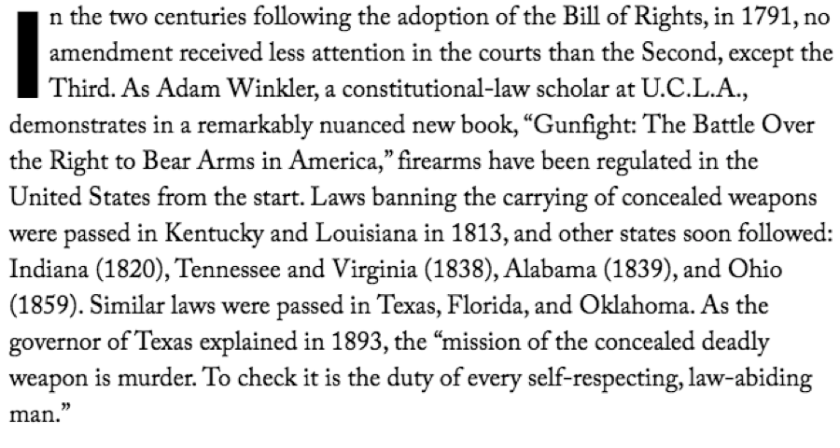
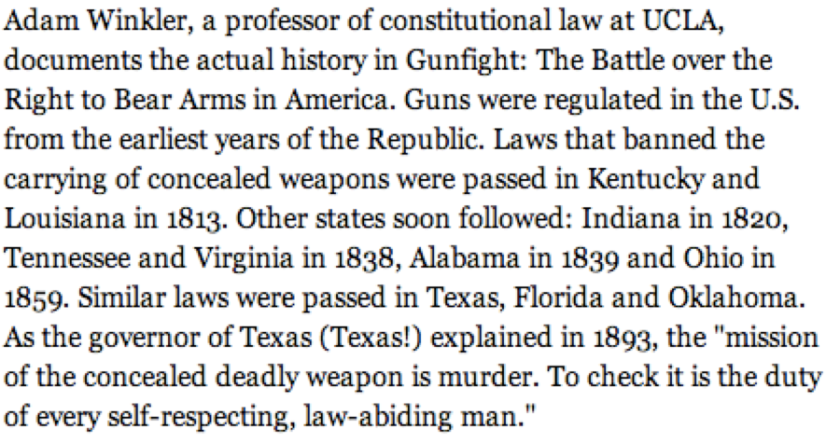

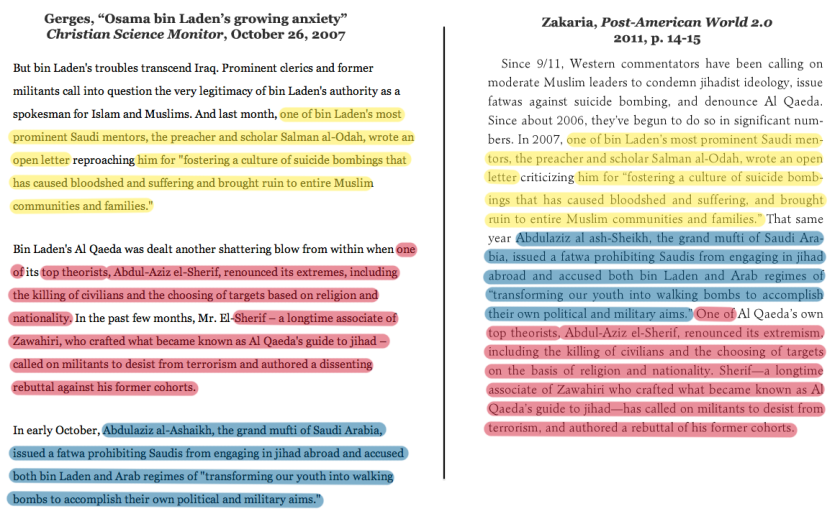
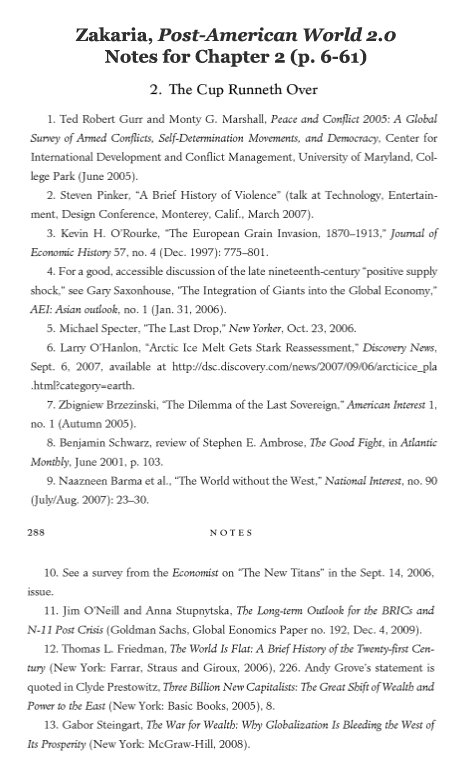
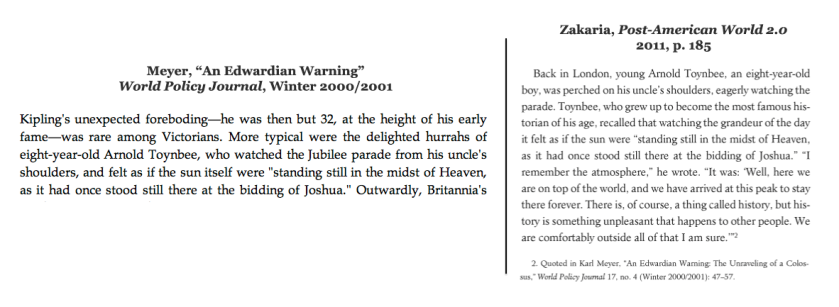
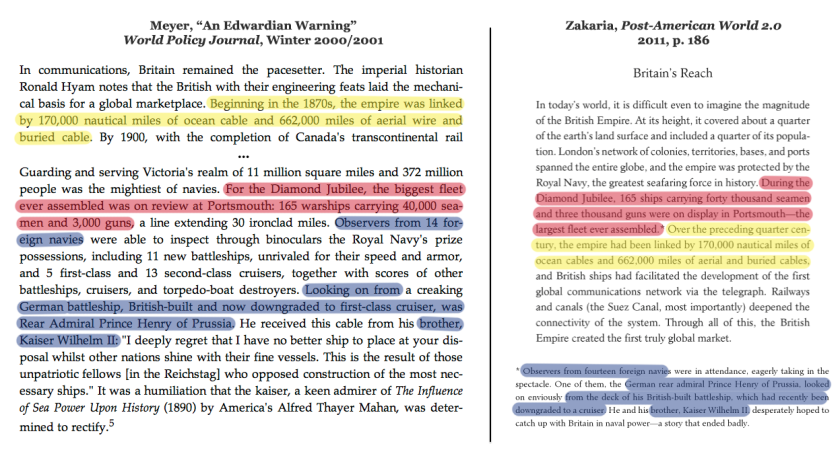
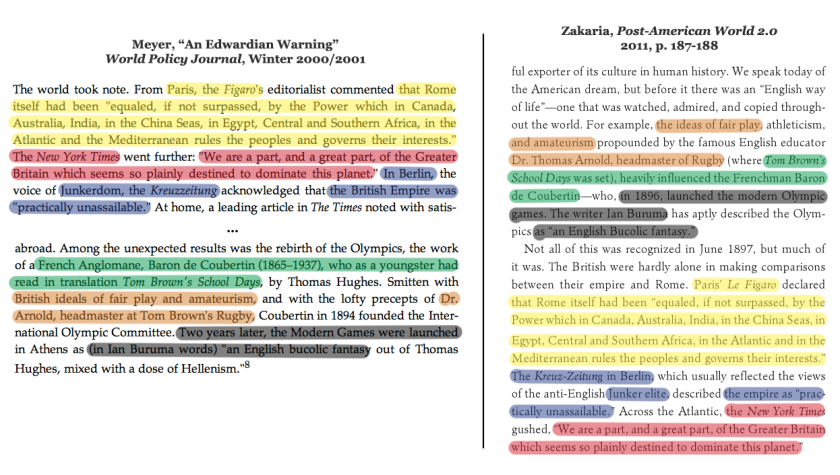


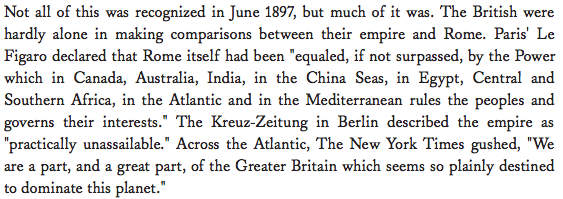
Well done, Anonymous Bloggers! So far I’ve seen disappointingly little coverage among the major outlets. Perhaps you are correct in stating “…you can apparently reach a point where ethics are no longer necessary as long as you’re bringing in ratings or a prestigious byline.” Now that you’ve exposed one of their bestsellers, perhaps the NY Times will start covering the story. Let’s wait and see…
LikeLike
It looks like he is simply using a thesaurus to change out certain words for synonyms.
LikeLike
This affects his credulity. He then dissembles to defend his plagIarism. Collegiates are severely penalized when they plagiarize. However, our leading media see no evil, hear no evil & speak no evil.
LikeLike
Zakraria would be flunked if he did this in a composition class, maybe even disciplined, depending on how extensive his plagiarism goes. He is not condemned by his media colleagues because they probably worry about being charged with the same offense.
LikeLiked by 1 person
@Bryce Dixon: Not only would be be “flunked” – he’d have violated the honor code of most universities, and would most likely be expelled.
LikeLike
As a faithful ‘watcher’ of Fareed Zakaria’s TV show each week (GPS), I was extremely disappointed to learn of his use of plagiarism in his writings. If he fails to address this issue on his show to explain his use of other’s work I will no longer feel comfortable watching his show each week.
LikeLike
I’m very sad, but I remember the brief plagiarism offense of 2012. I regard Fareed as my hero, but i wonder if he may have taken some of my tweets by now! I sent him stuff on the Liberal Islam of Indonesia.
LikeLike